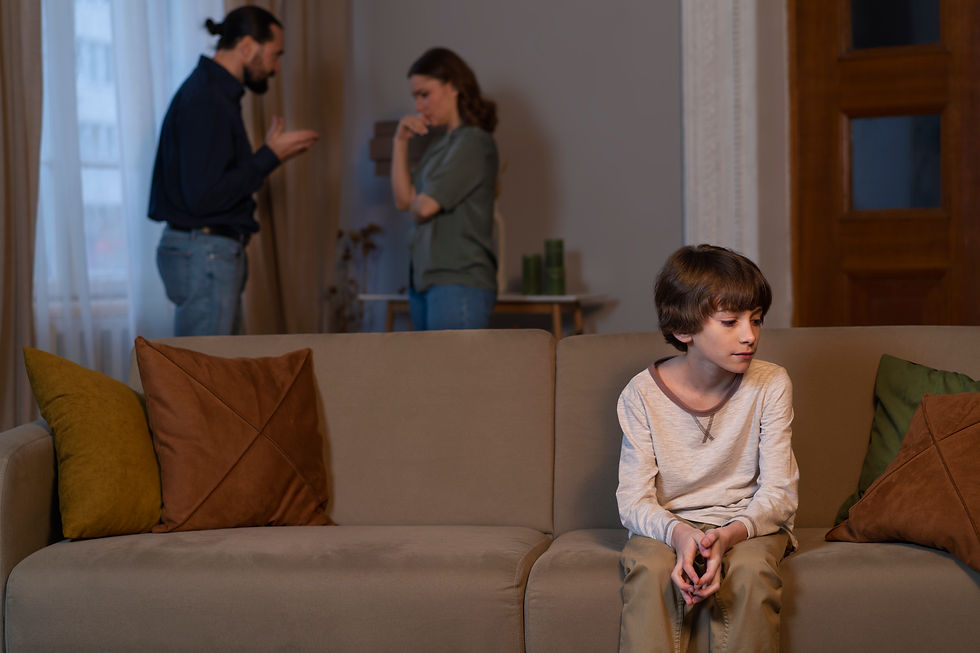🏃♂️ Moving Minds: How Exercise Helps Children & Teens Manage Depression
- Lana Alencar

- Jun 13, 2025
- 3 min read

Did you know that regular exercise isn’t just good for the body—it’s great for young
minds too? A recent podcast featuring Dr. Nicholas Fabiano, a psychiatry resident and researcher at the University of Ottawa, reveals compelling evidence that physical activity can significantly reduce depression symptoms in children and adolescents.
🎧 Listen to the Full Podcast Here
📊 Key Insights from the Podcast
Dr. Fabiano explains that while about 2.6% of youth have clinical depression, the pandemic saw symptoms appear in roughly 25% of young people.
He highlights how depression in youth often looks different than in adults, with issues like irritability, sleep or appetite changes, low energy, concentration problems at school, and, in some cases, thoughts of death .
A major concern is the rise in sedentary behaviour—children spending over 50% of their waking time inactive, often glued to screens—which is strongly linked to higher rates of depression and poorer overall health .
✅ Why Movement Matters
Dr. Fabiano and related studies emphasize that aerobic exercise and combined training (aerobic + resistance) show the strongest effects on improving youth depression
Here’s what recent research reveals:
A large meta-analysis found moderate-to-vigorous exercise (40–50 min, 3–4x/week over 6–12 weeks) had moderate-to-large effects in reducing adolescent depression.
Another network meta-analysis confirmed that exercise interventions lasting at least 12 weeks, 20–60 min per session, 3+ times weekly, sustained benefits for up to 40 weeks afterward.
🛠️ Practical Tips for Parents
Here’s how you can support your child’s well-being through movement:
Use the FITT model:
Frequency: Aim for 3–4 sessions weekly.
Intensity: Moderate to vigorous (“talk but not sing”).
Type: Prefer aerobic or mixed (e.g., team sports, martial arts).
Time: 20–60 minutes per session
Start Small and Build
Begin with short bursts—a 15-minute walk or bike ride—and gradually increase duration and intensity.
Pick Activities They Enjoy
Kids stick with what they like—team sports, martial arts, dance, cycling, or even playing in the park.
Family Involvement
Join in with a bike ride, backyard game, or walk. Your support makes a difference.
Keep Screen Time in Check
Encourage breaks from screens in favour of physical activity.
Combine with Therapy or Medication
Exercise enhances traditional treatments like counselling or medication—it’s not one or the other.
🏋️♀️ Local Options in Pembina Valley

RISE Athletics – Winkler: Fitness, youth fitness classes, Brazilian Jiu-Jitsu, Muay Thai, MMA for ages 6+
Joga Bonito Soccer Academy- Winkler: Soccer for kids 11-17, Fall and Winter sessions available
Morden Gymnastics Magics Club - Morden: recreational & competitive, regional stream, artistic gymnastics club for kids ages 1+
💡 Takeaway Message
Encouraging regular, enjoyable movement—ideally 20–60 minutes of moderate-to-vigorous activity multiple times per week—can significantly reduce depression symptoms and support your teen’s mental and emotional well-being.
Exercise isn’t a cure-all, but it’s a powerful, accessible tool—especially when combined with counselling or medical care. If you’re concerned about your child's emotional health, helping them get active is a meaningful and preventive step you can take today.
📚 References & Resources
Podcast🎧
Local Youth Gyms & Combat Sports in Pembina Valley
🏋️♂️ RISE Athletics – Winkler
Research and Articles
Supporting Information
.png)



Comments